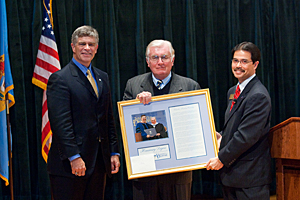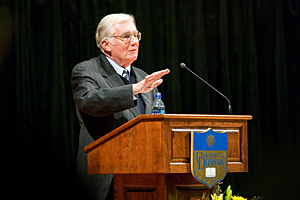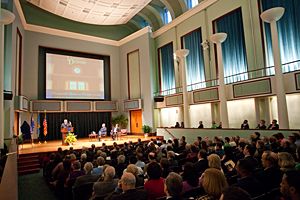
- Rozovsky wins prestigious NSF Early Career Award
- UD students meet alumni, experience 'closing bell' at NYSE
- Newark Police seek assistance in identifying suspects in robbery
- Rivlin says bipartisan budget action, stronger budget rules key to reversing debt
- Stink bugs shouldn't pose problem until late summer
- Gao to honor Placido Domingo in Washington performance
- Adopt-A-Highway project keeps Lewes road clean
- WVUD's Radiothon fundraiser runs April 1-10
- W.D. Snodgrass Symposium to honor Pulitzer winner
- New guide helps cancer patients manage symptoms
- UD in the News, March 25, 2011
- For the Record, March 25, 2011
- Public opinion expert discusses world views of U.S. in Global Agenda series
- Congressional delegation, dean laud Center for Community Research and Service program
- Center for Political Communication sets symposium on politics, entertainment
- Students work to raise funds, awareness of domestic violence
- Equestrian team wins regional championship in Western riding
- Markell, Harker stress importance of agriculture to Delaware's economy
- Carol A. Ammon MBA Case Competition winners announced
- Prof presents blood-clotting studies at Gordon Research Conference
- Sexual Assault Awareness Month events, programs announced
- Stay connected with Sea Grant, CEOE e-newsletter
- A message to UD regarding the tragedy in Japan
- More News >>
- March 31-May 14: REP stages Neil Simon's 'The Good Doctor'
- April 2: Newark plans annual 'wine and dine'
- April 5: Expert perspective on U.S. health care
- April 5: Comedian Ace Guillen to visit Scrounge
- April 6, May 4: School of Nursing sponsors research lecture series
- April 6-May 4: Confucius Institute presents Chinese Film Series on Wednesdays
- April 6: IPCC's Pachauri to discuss sustainable development in DENIN Dialogue Series
- April 7: 'WVUDstock' radiothon concert announced
- April 8: English Language Institute presents 'Arts in Translation'
- April 9: Green and Healthy Living Expo planned at The Bob
- April 9: Center for Political Communication to host Onion editor
- April 10: Alumni Easter Egg-stravaganza planned
- April 11: CDS session to focus on visual assistive technologies
- April 12: T.J. Stiles to speak at UDLA annual dinner
- April 15, 16: Annual UD push lawnmower tune-up scheduled
- April 15, 16: Master Players series presents iMusic 4, China Magpie
- April 15, 16: Delaware Symphony, UD chorus to perform Mahler work
- April 18: Former NFL Coach Bill Cowher featured in UD Speaks
- April 21-24: Sesame Street Live brings Elmo and friends to The Bob
- April 30: Save the date for Ag Day 2011 at UD
- April 30: Symposium to consider 'Frontiers at the Chemistry-Biology Interface'
- April 30-May 1: Relay for Life set at Delaware Field House
- May 4: Delaware Membrane Protein Symposium announced
- May 5: Northwestern University's Leon Keer to deliver Kerr lecture
- May 7: Women's volleyball team to host second annual Spring Fling
- Through May 3: SPPA announces speakers for 10th annual lecture series
- Through May 4: Global Agenda sees U.S. through others' eyes; World Bank president to speak
- Through May 4: 'Research on Race, Ethnicity, Culture' topic of series
- Through May 9: Black American Studies announces lecture series
- Through May 11: 'Challenges in Jewish Culture' lecture series announced
- Through May 11: Area Studies research featured in speaker series
- Through June 5: 'Andy Warhol: Behind the Camera' on view in Old College Gallery
- Through July 15: 'Bodyscapes' on view at Mechanical Hall Gallery
- More What's Happening >>
- UD calendar >>
- Middle States evaluation team on campus April 5
- Phipps named HR Liaison of the Quarter
- Senior wins iPad for participating in assessment study
- April 19: Procurement Services schedules information sessions
- UD Bookstore announces spring break hours
- HealthyU Wellness Program encourages employees to 'Step into Spring'
- April 8-29: Faculty roundtable series considers student engagement
- GRE is changing; learn more at April 15 info session
- April 30: UD Evening with Blue Rocks set for employees
- Morris Library to be open 24/7 during final exams
- More Campus FYI >>
4:01 p.m., Nov. 7, 2008----Charles Cawley, who built MBNA Corp. from a shoestring operation into the nation's largest independent credit card company in just 21 years, told a University of Delaware audience Thursday, Nov. 6, that the term entrepreneur “is far broader and much more important” than commonly thought.
“Entrepreneurial, creative, risk-taking--they all mean the same thing,” Cawley said in delivering the inaugural Presidential Lecture on Entrepreneurship to a capacity crowd in the Louise and David Roselle Center for the Arts' Gore Recital Hall. He urged the audience of students, faculty and community members, including many of his former colleagues, to use the adjective form of the word and to think of “the entrepreneurial spirit” as not limited to those who start their own businesses but as also found in some employees of large organizations.
“I was an entrepreneurial manager” from the start, said Cawley, who founded MBNA in 1982 as a subsidiary of Maryland National Bank and retired in 2003 as president and chief executive officer of what had become its own corporation. He said he and the four other executives who founded the company always thought and worked with an entrepreneurial attitude that led them to try new approaches and to have confidence in the eventual success of their ideas.
“We decided that, to be successful, we had to get the right customers, and we had to keep the right customers,” Cawley said, adding that the large credit card companies with which MBNA was competing “didn't think about that much” in the early 1980s. Those companies were large businesses that functioned and made decisions automatically, not entrepreneurially, he said.
By contrast, MBNA began by renting space in a vacant supermarket in Ogletown, Del., where Cawley said the company's future was so uncertain that the founders signed a dozen 30-day leases in case they went out of business in less than a year. He described the company at the time as having 50 employees, 75,000 accounts totaling about $200 million and a ranking of No. 36 in size among 52 credit card issuers.
Through creative marketing and such pioneering innovations as the creation of “affinity group” credit cards, as well as a careful selection of credit-worthy customers--“We had no subprime customers; we had prime customers,” Cawley told his audience--MBNA grew at a rapid pace. By the time Cawley retired in 2003, the company had 50 million customers, 30,000 employees worldwide, including 11,000 in Delaware, $120 billion in loans and $2.3 billion in after-tax profits. In 2005, MBNA was acquired by Bank of America.
Affinity marketing, Cawley said, proved to be “a way to get the right customers in a way nobody else was doing.” By issuing specific types of credit cards to members of designated groups, MBNA was able to develop a customer base that included 700 colleges and universities, including UD, and a majority of the physicians, attorneys, dentists and engineers in the U.S.
MBNA's focus was entrepreneurial in other ways as well, Cawley said, with employees--always called “the people of MBNA”--as the company's first priority, followed by customer satisfaction, then shareholder satisfaction and philanthropy in the community.
Cawley also praised the late Alfred Lerner, for whom UD's Lerner College of Business and Economics is named, as “a true businessman and entrepreneur.” Mr. Lerner was the chairman of MBNA from 1991 until his death in 2002, and Cawley credited him with obtaining the financing that enabled the company to go public in 1991.
Mr. Lerner wasn't usually the person who started the businesses in which he was involved or even had the idea of starting them, Cawley said. Instead, he said, “He was an entrepreneurial helper. He made things happen.”
Cawley was introduced by University President Patrick Harker, who said the lecture series originated as part of UD's increasing emphasis on entrepreneurship and innovation by students and faculty members, both individually and in collaborative partnerships. He described the inaugural speaker as someone whose entrepreneurial spirit “has had a lasting impact on this University, on this state and on the nation.”
After the lecture, Harker and Conrado “Bobby” Gempesaw, dean of the Lerner College, presented Cawley with a framed tribute recognizing the honorary doctor of humanities degree the University conferred on him at Commencement in May.
The lecture was preceded by Cawley's visit to the Lerner College's new Venture Development Center, where he sat down with some students for an informal question-and-answer session.
After the lecture, a reception was held in the Roselle Center for the Arts.
Article by Ann Manser
Photos by Kevin Quinlan




